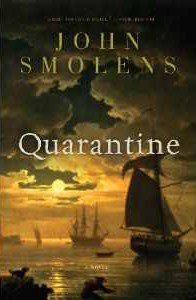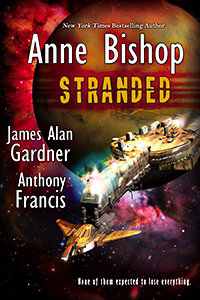Quarantine by John Smolens
 Friday, September 7, 2012 at 8:29AM
Friday, September 7, 2012 at 8:29AM 
Published by Pegasus on September 5, 2012
In the summer of 1796, Newburyport's harbormaster recruits Giles Wiggins to perform a medical inspection of the Miranda, newly arrived from France. Wiggins discovers that most members of the crew are dead or dying. Although the doctor quarantines the ship, several crewmen row into Newburyport. Soon the fever spreads through the town. Since Newburyport's doctors have no clue as to the cause of the disease and no effective means to treat it, it becomes necessary to quarantine the town.
Although the plot involves drugs that have been stolen from the town's apothecaries -- drugs that cannot be used to treat the ill unless town leaders pay an extortionate price to reclaim them -- the story revolves around a prominent Newburyport family, one that has replaced family spirit with murderous intent. Enoch Sumner owns the Miranda, a ship he named after his matriarchal mother, who is also the mother of Giles Wiggins, Enoch's half-brother. Enoch's son, Samuel, is a ne'er-do-well spendthrift who, returning from France on the Miranda, joined the crew members who escaped from the ship in a rowboat. Marie de Monpellier, a French girl who was a passenger on the Miranda before she swam ashore, becomes a guest of the family after Leander Hatch saves her from drowning. Leander eventually joins the family's staff as a stable hand, although (unlike the reader) Leander won't understand his true relationship to the family until the novel's end.
Quarantine often has the flavor of a melodrama as characters and storylines intersect in coincidental and improbable ways. At times I was reminded of Dickens, particularly when a character named Uriah entered the mix. There is, however, considerably more sex in Quarantine than you'll find in Dickens, making this, I suppose, a modern form of melodrama. As is typically true of melodrama, the story is far from subtle. Quarantine is often more interesting for its background details -- the belief that the fever sweeping the town is retribution for the town's sinful ways, the arguments about appropriate medical care, the role played by privateers who made their fortunes seizing British ships during the war -- than for the family drama that occupies the foreground.
Despite being melodramatic and a bit scattered, Quarantine is engaging. John Smolens' prose is lively and his characters have enough personality to make up for their lack of depth. The period and place are convincing. I had difficulty believing Miranda's motivation to engage in certain nefarious behavior that is central to the story, and I was less than enthralled by the uninspired love stories (Giles is the focus of one, Leander of the other). Given the emphasis that melodrama places on emotion, the love stories -- particularly Leander's -- seem surprisingly hollow. For the most part, however, Quarantine is entertaining and, like any good melodrama, it leads to a satisfying conclusion.
RECOMMENDED



